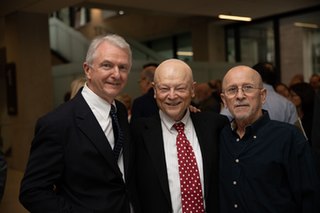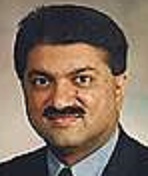The John von Neumann Theory Prize of the Institute for Operations Research and the Management Sciences (INFORMS) is awarded annually to an individual who has made fundamental and sustained contributions to theory in operations research and the management sciences.

Cost accounting is defined by the Institute of Management Accountants as "a systematic set of procedures for recording and reporting measurements of the cost of manufacturing goods and performing services in the aggregate and in detail. It includes methods for recognizing, allocating, aggregating and reporting such costs and comparing them with standard costs". Often considered a subset of managerial accounting, its end goal is to advise the management on how to optimize business practices and processes based on cost efficiency and capability. Cost accounting provides the detailed cost information that management needs to control current operations and plan for the future.
Operations research, often shortened to the initialism OR, is a discipline that deals with the development and application of analytical methods to improve decision-making. The term management science is occasionally used as a synonym.
Productivity is the efficiency of production of goods or services expressed by some measure. Measurements of productivity are often expressed as a ratio of an aggregate output to a single input or an aggregate input used in a production process, i.e. output per unit of input, typically over a specific period of time. The most common example is the (aggregate) labour productivity measure, one example of which is GDP per worker. There are many different definitions of productivity and the choice among them depends on the purpose of the productivity measurement and data availability. The key source of difference between various productivity measures is also usually related to how the outputs and the inputs are aggregated to obtain such a ratio-type measure of productivity.
Data envelopment analysis (DEA) is a nonparametric method in operations research and economics for the estimation of production frontiers. DEA has been applied in a large range of fields including international banking, economic sustainability, police department operations, and logistical applications Additionally, DEA has been used to assess the performance of natural language processing models, and it has found other applications within machine learning.
Scientometrics is a subfield of informetrics that studies quantitative aspects of scholarly literature. Major research issues include the measurement of the impact of research papers and academic journals, the understanding of scientific citations, and the use of such measurements in policy and management contexts. In practice there is a significant overlap between scientometrics and other scientific fields such as information systems, information science, science of science policy, sociology of science, and metascience. Critics have argued that overreliance on scientometrics has created a system of perverse incentives, producing a publish or perish environment that leads to low-quality research.
Goal programming is a branch of multiobjective optimization, which in turn is a branch of multi-criteria decision analysis (MCDA). It can be thought of as an extension or generalisation of linear programming to handle multiple, normally conflicting objective measures. Each of these measures is given a goal or target value to be achieved. Deviations are measured from these goals both above and below the target. Unwanted deviations from this set of target values are then minimised in an achievement function. This can be a vector or a weighted sum dependent on the goal programming variant used. As satisfaction of the target is deemed to satisfy the decision maker(s), an underlying satisficing philosophy is assumed. Goal programming is used to perform three types of analysis:
- Determine the required resources to achieve a desired set of objectives.
- Determine the degree of attainment of the goals with the available resources.
- Providing the best satisfying solution under a varying amount of resources and priorities of the goals.

In microeconomic theory, productive efficiency is a situation in which the economy or an economic system operating within the constraints of current industrial technology cannot increase production of one good without sacrificing production of another good. In simple terms, the concept is illustrated on a production possibility frontier (PPF), where all points on the curve are points of productive efficiency. An equilibrium may be productively efficient without being allocatively efficient — i.e. it may result in a distribution of goods where social welfare is not maximized.
William David Haseman was an American computer scientist who was an expert in Management Information Systems and Wisconsin Distinguished Professor of MIS of University of Wisconsin–Milwaukee (UWM). His expertise is Internet-based technologies.

The American Accounting Association (AAA) promotes accounting education, research and practice. The Association mission is to further the discipline and profession of accounting through education, research and service.
The Carnegie School is a school of economic thought originally formed at the Graduate School of Industrial Administration (GSIA), the current Tepper School of Business, of Carnegie Institute of Technology, the current Carnegie Mellon University, especially during the 1950s to 1970s.

Profit, in accounting, is an income distributed to the owner in a profitable market production process (business). Profit is a measure of profitability which is the owner's major interest in the income-formation process of market production. There are several profit measures in common use.

Bruce Dehning is an American professor and scholar who spent almost his entire career in the collegiate realm. He is known primarily for his work researching the effect of information technology (IT) on firm performance for which he is a two-time winner of the Notable Contribution to the Accounting Information Systems Literature award (with Vernon J. Richardson in 2006, and with Vernon J. Richardson and Robert W. Zmud in 2013. He has thirty two total refereed publications, including three premier publications, ten top tier publications, and thirteen impact factor publications. His published work has been cited more than 3,600 times, making him one of the top ten most cited Accounting Information Systems researchers in the world.
William Wager Cooper was an American operations researcher, known as a father of management science and as "Mr. Linear Programming". He was the founding president of The Institute of Management Sciences, founding editor-in-chief of Auditing: A Journal of Practice and Theory, a founding faculty member of the Graduate School of Industrial Administration at the Carnegie Institute of Technology, founding dean of the School of Urban and Public Affairs at CMU, the former Arthur Lowes Dickinson Professor of Accounting at Harvard University, and the Foster Parker Professor Emeritus of Management, Finance and Accounting at the University of Texas at Austin.
Varun Grover is an American Information systems researcher, who is the George & Boyce Billingsley Endowed Chair and distinguished professor at the Walton School of Business, University of Arkansas. From 2002-17, he was the William S. Lee Distinguished Professor of Information Systems at Clemson University, where he taught doctoral seminars on methods and information systems. He is consistently in the top 3 IS researchers in the world. He has an h-index of 100, among the top 5 in his field Grover has around 52,000 citations in Google Scholar and over 13,900 citations in Web of Science.
Abraham Charnes was an American mathematician who worked in the area of operations research. Charnes published more than 200 research articles and seven books, including An Introduction to Linear Programming. His works influenced the development of Data envelopment analysis (DEA) method.
Edwardo Lao Rhodes is an American management science scholar and author. An Emeritus Professor at the Indiana University School of Public and Environmental Affairs, Rhodes is best known for his seminal work in data envelopment analysis, as well as his applications of management science to policy analysis and environmental policy.
Robert McDowell Thrall (1914–2006) was an American mathematician and a pioneer of operations research.

Ehsan H. Feroz is a Bangladeshi-born Muslim American professor, researcher, and an author. He is a tenured full professor of accounting at the University of Washington Tacoma’s Milgard School of Business and served as the Director of the Master of Accounting Program.

Joseph C. Paradi is a senior professor of Chemical Engineering at the University of Toronto. Paradi is the founder and executive director of the Centre for Management of Technology and Entrepreneurship. He is also a chair holder in Information Engineering, Department of Chemical Engineering and Applied Chemistry.







